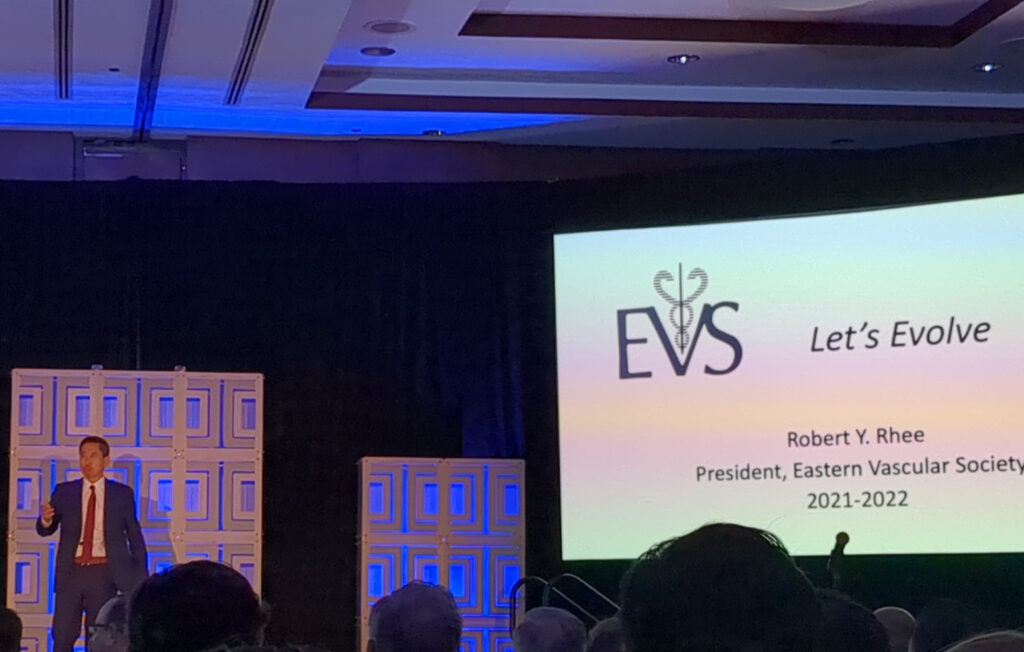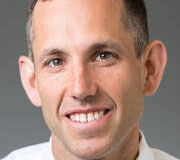
Evolution was the core theme of the Presidential Address Robert Rhee, MD, delivered from the Eastern Vascular Society (EVS) annual meeting stage in Philadelphia (Sept. 29–Oct. 1). “Let’s Evolve,” it was entitled. But, Rhee told those gathered, the society lays claim geographically to the Eastern seaboard of the United States and Canada, which is home to “the most incredibly diverse and quantitatively the largest number of training programs” anywhere else in North America. So he had a specific audience in mind for his presidential message contained.
“I thought it would be befitting to direct my address to the younger and possibly the greatest generation of vascular surgeons ever, because you are going to take us into that next level of evolution,” said Rhee.
The endovascular aneurysm repair (EVAR) revolution encapsulates the essence of out-of-the-box thinking required to achieve that revolution, he told the audience.
“We, as a pioneering specialty, turned a very maximally invasive operation into a minimally invasive one,” Rhee said—with “excellent long-term results 25 years later.”
“It’s not a failed experiment, as some recent editorial in the JVS [Journal of Vascular Surgery] has suggested. It transformed our specialty overnight to the highest levels, with excellent outcomes, which could not be really compared to any open AAA [abdominal aortic aneurysm] repair at most institutions.”
Rhee turned to the example of Timothy Chuter, MD, a pioneer in the development of endovascular repair, with whom he worked for a time: “Initially, when he came to us, he was thought to be crazy because the vascular chief at that time ridiculed him constantly at conference. I remember sitting down with him, and him preaching to me how stupid it was to treat a disease of expanding radial force with a device that has constant radial force.
“What would have happened if Timothy Chuter did not forge on and ignore his critics. He was not allowed to do the research involved with EVAR at the main university hospital because they thought he was crazy. So he went to a local, large community hospital, and they said, ‘Do it.’ They actually had the insight to allow him to do his EVAR studies.”
Rhee challenged members of the EVS gathering: “To all of you surgeons out there: be a Tim Chuter; don’t be a follower. If somebody discourages you, and you have an idea, pursue it.”
When it comes to evolution and revolution in vascular surgery, Rhee honed in on four high-level areas: Understanding the disease process and the limitations on what can be done. Embracing new technology “but not being blinded by false prophets.” Escaping from the ethical black hole. And embracing diversity to achieve success.
“Vascular surgery is still a relatively new field,” Rhee said, explaining how the specialty developed out of a sense of necessity among cardiac surgeon leaders in those early days. “Let us evolve and not overestimate our abilities by offering solutions that overtreat our patients.”
He was taught, by the vascular elder statesmen like Kenneth Cherry, MD, and Kenneth Ouriel, MD, that “less is better and faster is better for the patient.”
Rhee emphasized the need to ensure patients are not being overtreated by raising the figure of the late Roy Greenberg, MD, another vascular pioneer.
“He introduced one key concept that we should all take a second look at in 2022, “ he said. “That is, he advocated, after coming back from Malmo, Sweden, that we should always treat to the healthy aorta. It’s a modus operandi that is religiously followed by all these aortic surgeons throughout the world now. But it’s a very dangerous concept in essence, because, by definition, it overtreats patients. Because you’re putting in stents and devices into healthy portions of the aorta.”
Rhee asked the audience whether this level of treatment was truly required in an arena of care where there is no cure, but where vascular specialists are pursuing “endovascular protection.”
“It’s almost heresy to say that, but when you look back, and at the history of vascular surgery and surgical management, you realize if you have a patient with abdominal aortic aneurysm, the entire aorta is diseased; there is no healthy aorta. So, what are you treating to? I challenge you. I do four-vessel thoracoabdominal [aneurysms] all the time, but I’m saying that we all should take a look at it, and not follow religiously at this point.”
Question everything as new technology emerges, continued Rhee. “From the very beginning, vascular surgery had access to a dizzying array of tools, and we embraced that. There are countless examples of tools we have developed for the management of vascular disease; however, there is a dark side to the technology.”
The Food and Drug Administration (FDA) approval process brings countless numbers to the table every year, specifically through the 510k route, he noted—“about 80% of the devices you all use now.”
This means, Rhee said, “a device company is allowed to sell their devices to you to be used in your patients because the device looks and performs like a similar, already approved device. Many of these devices don’t have any data, and they are still approved and marketed for use in your patients.”
Therefore, “not all of the shiny new toys have the data,” he commented, and it is incumbent upon vascular surgeons to conduct research to establish device safety, raising the concept of what he called “false prophets.”
Rhee urged caution over the ethical conundrums that face the profession. “We have this financial pressure to produce not just volume, but also in clinical research and basic research. We have to make sure there is an ethical component and accuracy of the research is ever-present throughout our careers.”
Rhee also addressed diversity, tackling the topic through the prism of his challenge for the specialty to “question everything.” He referred to the experience of a female senior resident who during his own training questioned a leading surgeon who held viewpoints that held that she should not enter vascular surgery because of the fact she was a woman. “Should we cancel him because he said that?” Rhee stated. “He was thinking 1989 beliefs. Yes he was an incredible pioneer but he had the beliefs of back then. The essence is of evolution is to question everything.” That female resident fought through the pushback and entered vascular practice, Rhee added.
He placed vascular surgery in the guise of “a microcosm of the world’s controversies.” And as vascular surgery evolves to the next level, inclusivity will be key, Rhee said. In that vein, the EVS is poised to extend full membership to all allied health members and beyond. “Vascular surgeons do not own vascular disease,” Rhee added. “There are blood vessels everywhere … It doesn’t matter where the controversy is. But my vision is that vascular surgery—because our field encompasses the entire body—we should be the gatekeepers and the quality keepers of vascular disease.”











